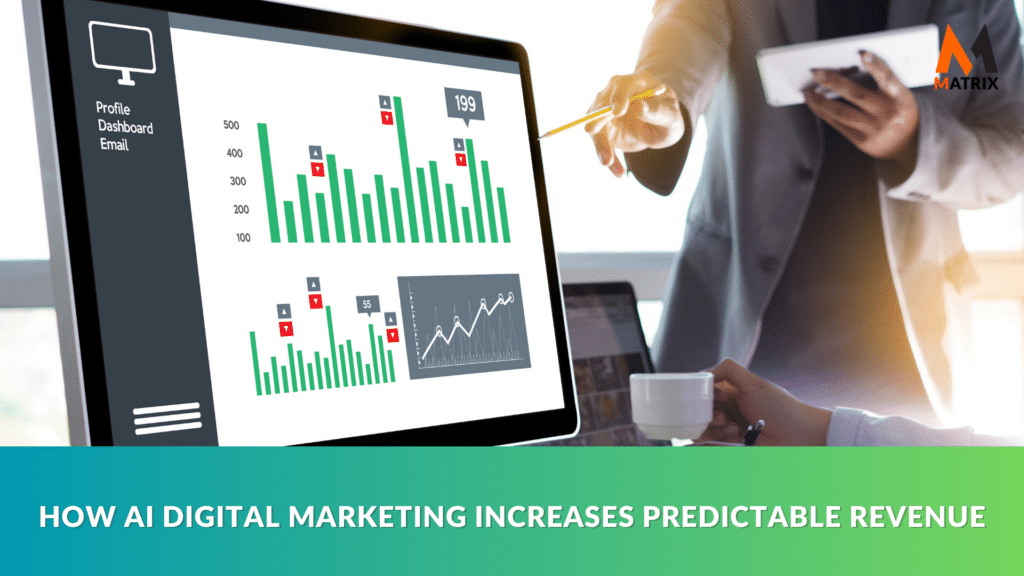Do you ever feel like your business’s marketing efforts are just a shot in the dark? If manual marketing workflows and budget constraints have limited your ability to reach potential customers, AI digital marketing is here to help.
With AI digital marketing technology, businesses can boost their campaigns with predictive insights into customer behavior that increase revenue and deliver more predictable results.
In this blog post, we’ll explore how leveraging data-driven decisions through AI digital marketing helps companies maximize ROI and improve efficiency by allowing them to manage resources for an effective growth strategy, predictably.
Understand the Basics of AI Digital Marketing and How it Helps Increase Predictable Revenue.

In today’s world, where digital marketing is a must-have strategy, the emergence of artificial intelligence (AI) has made it even more effective and efficient. Understanding the basics of AI digital marketing can help you increase predictable revenue in your business.
AI can help analyze market trends, customer behavior patterns, and preferences, providing valuable insights into what your customers want and how to reach them effectively. Using AI tools, you can develop personalized marketing campaigns that drive targeted traffic to your website, which helps you convert leads into sales.
With AI technology, creating a customer journey map becomes easier, enabling you to provide a seamless experience to your customers at every touchpoint.
So, if you want to stay ahead of the game and drive revenue growth, it’s time to learn how to leverage AI technology for your digital marketing strategies. 10 Most In-Demand Types of SEO Services to Focus On in 2025
Gather Insights from Data-driven Market Research
In today’s business world, data is everywhere. From website analytics to customer surveys, we have access to a wealth of information that can inform our decisions and strategy.
However, it’s not enough to collect data – we need to know how to gather insights to drive growth. That’s where data-driven market research comes in.
Analyzing data using statistical techniques can uncover hidden patterns and trends, identify customer preferences, and understand market dynamics.
With these insights, we can make informed decisions that drive growth and revenue. So if you want to stay ahead of the competition, it’s time to embrace data-driven market research and turn data into actionable insights.
I. Introduction: Achieving Predictable Revenue

Any business owner knows that revenue is one of the biggest concerns. Without reliable forecastable revenue, planning for the future and making informed decisions become difficult.
This is where the concept of achieving your target revenue becomes critical. This involves creating a sustainable system that consistently generates revenue without relying on one-time or sporadic deals.
Achieving and sustaining your revenue is not a one-time solution, but an ongoing process requiring adaptation and continuous improvement.
By implementing proven strategies, such as setting sales targets, identifying the most valuable leads, and creating effective marketing campaigns, businesses can ensure a steady stream of revenue that will help them thrive in the long term. Content Translation Services: A Competitive Advantage for Your Business
A. Brief definition of AI Digital Marketing
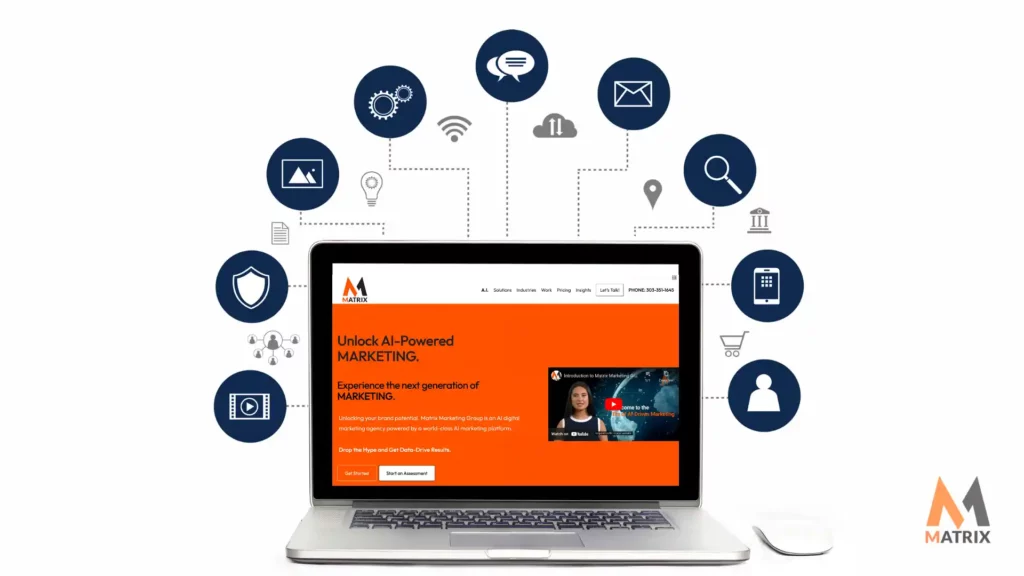
Artificial Intelligence (AI), once considered a thing of the future, has already entered the digital marketing world.
AI digital marketing refers to using AI technology to improve the efficiency and effectiveness of marketing campaigns.
AI algorithms can predict consumer behavior and personalize marketing strategies by analyzing data from various sources, including social media, websites, and customer interactions. This means more relevant advertising for customers and better results for marketers.
AI digital marketing is transforming how companies advertise their products and services, and it’s an exciting development in the marketing industry.
B. Importance of AI in modern marketing strategies

In today’s fast-paced world, marketing strategies must keep up with the times. This is where the importance of AI comes into play.
Utilizing the power of Artificial Intelligence, businesses can personalize their interactions with customers and predict their preferences. By analyzing the data, AI technology allows marketers to create highly targeted ads and retarget potential customers.
Moreover, AI-powered chatbots provide a round-the-clock customer service experience that is cost-effective and efficient. With AI, businesses can streamline their marketing efforts, enhance customer engagement, and increase revenue and brand loyalty.
As we move towards a more technology-driven future, AI will continue to serve as a valuable asset in modern marketing strategies.
C. Understanding the Concept of Repeatable Revenue

Reliable forecastable revenue is a critical concept that every business owner should know. It refers to the ability to forecast and rely on a steady income flow over a defined period.
This can be achieved through various methods, such as implementing a subscription-based model, targeting repeat customers, or developing a consistent marketing strategy.
While your target revenue is essential for businesses to grow and scale sustainably, achieving it can be challenging. It requires a deep understanding of your customer base, a strategic approach to sales and marketing, and an unwavering commitment to delivering exceptional value.
By mastering the concept of dependable revenue, businesses can build a solid foundation for long-term success and profitability. You can throttle your revenue and know your return, minimizing risk.
II. Understanding the Mechanisms of AI in Digital Marketing
In the ever-evolving world of digital marketing, understanding the mechanisms behind artificial intelligence (AI) is essential for businesses to remain competitive and succeed.
AI can analyze vast amounts of data and identify patterns, enabling marketers to make informed decisions and target customers more effectively. By utilizing machine learning algorithms, AI can predict consumer behavior and automate certain tasks, freeing up time for marketers to focus on strategy and creativity.
However, it’s important to remember that AI is a tool, not a replacement for human input, and careful consideration should be given to how it’s implemented in a marketing strategy. By gaining a deeper understanding of these mechanisms, businesses can harness the power of AI and create more impactful campaigns that drive results.
A. Overview of AI capabilities relevant to marketing

Artificial intelligence, or AI, has made significant strides in many industries in recent years, and marketing is no exception.
With its advanced algorithms and machine learning capabilities, AI can analyze vast amounts of data to create insights marketers can use to target audiences with the right messages.
For example, AI can be used to personalize advertisements based on a customer’s purchasing behavior or predict which products a customer will likely buy next. Additionally, AI can help automate repetitive marketing tasks such as email campaigns and social media posting, allowing marketers to focus on more strategic initiatives.
The possibilities of AI in marketing are vast, and as technology continues to evolve, we can expect to see even more innovative uses of AI in the future.
1. Machine Learning and Predictive Analytics
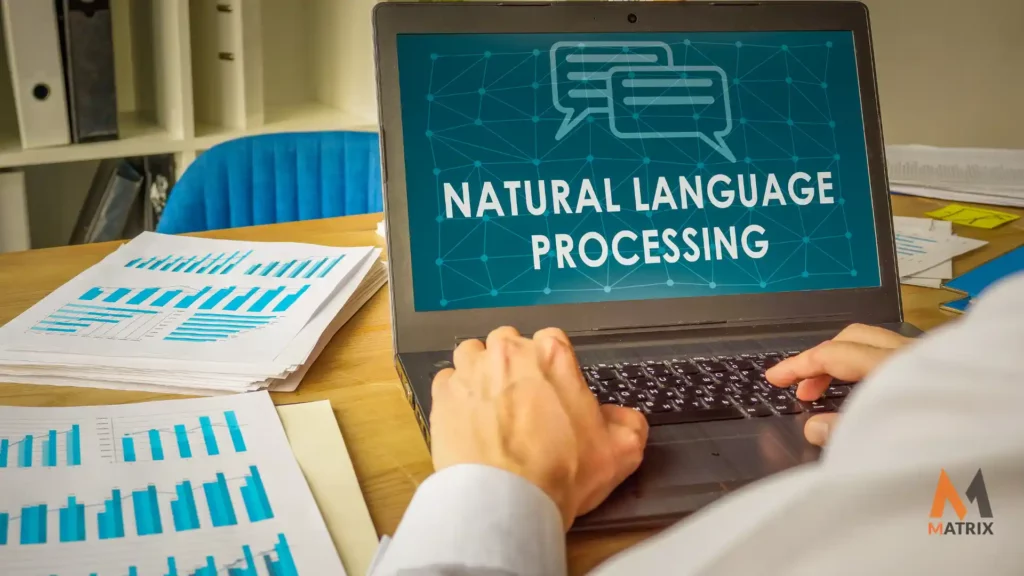
In data analysis, machine learning and predictive analytics have become buzzwords, gaining traction across various industries.
With advanced computing technologies, these techniques enable data scientists to uncover valuable insights hidden within large datasets and make predictions about future trends.
Machine learning, in particular, employs algorithms that continually learn from data, enabling the automation of decision-making processes and the optimization of operations.
On the other hand, predictive analytics leverages statistical modeling to identify patterns and predict future outcomes, enabling businesses to make informed decisions based on data-driven insights.
The potential applications of these powerful technologies are virtually limitless, making them essential tools for businesses seeking to stay ahead of the competition.
2. Natural Language Processing
Natural Language Processing, or NLP, is a remarkable field that has revolutionized how computers understand and interpret human language.
With NLP, machines can analyze, understand, and even generate text in various languages, including English, Spanish, Chinese, and more. But what language are we referring to exactly? In this case, the answer is EN-US or American English.
From analyzing social media posts to generating chatbot conversations, NLP technology can decipher this specific language code and respond accordingly. As language evolves and changes over time, so too does the process of natural language processing. But for now, EN-US remains a crucial component in this exciting field.
3. Image and Speech Recognition
Image and speech recognition have revolutionized how we interact with technology. With the ability to recognize and differentiate between images and speech, our devices have become more intuitive and responsive.
From accessing our favorite songs with a simple voice command to unlocking our phones with facial recognition, the possibilities of image and speech recognition are endless. The output language code, EN-US, is just one example of the diversity and customization these technologies can offer. With advancements in artificial intelligence and machine learning, the accuracy of image and speech recognition will continue to improve, making our lives even more efficient and convenient.
4. AI Chatbots
AI chatbots are revolutionizing the way businesses interact with their customers. These robotic assistants utilize sophisticated algorithms to simulate human-like conversations, providing a personalized experience tailored to each user.
They provide a seamless customer support experience, answering questions and solving problems in real-time. Additionally, they can save businesses valuable time and resources by handling simple and repetitive tasks, allowing employees to focus on more complex issues.
With the advances in natural language processing, AI chatbots are becoming increasingly Sophisticated. It’s not hard to imagine a future where we won’t be able to tell the difference between talking to a chatbot and a real human – and that’s pretty exciting.
B. Relationship between AI and Data in Marketing
Artificial intelligence (AI) and data analytics have revolutionized the marketing world recently. Through AI, marketers can now collect and analyze large volumes of data, allowing them to gain insights into consumer preferences and behavior patterns.
By analyzing this data, brands can create targeted marketing campaigns and tailor their messaging to reach specific audiences.
This has led to more effective marketing strategies and greater ROI. However, AI is only as effective as the data it is fed. Clean, accurate, and relevant data is crucial to ensure the insights gained are accurate and actionable.
Therefore, a symbiotic relationship exists between AI and data in marketing, with each an integral component of the marketing ecosystem.
1. Importance of data in digital marketing
Data is at the heart of marketing campaigns in today’s digital landscape. It enables businesses to learn about customer behavior, preferences, and interactions with products or services.
Without data, marketing campaigns are more educated guesses on the actions that could deliver results. With data, businesses can make informed decisions to ensure their campaigns resonate with their target audience and ultimately deliver the desired outcome.
Data is crucial in digital marketing, from understanding the effectiveness of social media posts to measuring website traffic and conversions. It helps businesses optimize their efforts, understand customer behavior, and drive revenue growth.
Incorporating data into digital marketing is no longer an option but an essential practice for businesses that want to stay competitive in the digital space.
2. How AI uses and interprets data
Artificial Intelligence (AI) has revolutionized how we analyze and interpret data. Utilizing sophisticated algorithms, AI can quickly sort through vast amounts of data and identify patterns that would be impossible for humans to notice.
By examining outliers and historical trends, AI can offer valuable insights that enable organizations to make more informed decisions. Additionally, AI systems can continually learn from incoming data, refining their algorithms to provide more accurate predictions and insights over time.
With the ability to transform data into valuable insights, AI has immense promise to enhance our understanding of complex systems and drive businesses forward.
III. How AI Improves Marketing Strategies
Artificial Intelligence has revolutionized how we approach marketing strategies. With the ability to analyze enormous amounts of data, AI can provide invaluable insights into consumer behavior and market trends.
This enables businesses to tailor their marketing campaigns to their target audience’s specific needs and interests, ultimately leading to higher engagement rates and increased sales. AI can also automate repetitive tasks such as email marketing and social media management, freeing up time for marketers to focus on more complex tasks like creating personalized content.
As AI continues to develop and evolve, it is exciting to consider the endless possibilities it will bring to the marketing world, enhancing efficiency and driving success for businesses worldwide.
A. Personalized Marketing
Personalized marketing is the future of advertising. We no longer live in a one-size-fits-all world; consumers expect brands to understand their unique needs and preferences.
By tailoring marketing messages to individuals, companies can increase engagement and conversions.
With the help of data and technology, personalized marketing can be effectively implemented across various channels, including email campaigns and social media ads. By creating a personalized experience, brands can improve customer satisfaction and build loyalty in a crowded market.
The possibilities of personalized marketing are endless, and it’s exciting to see how companies will use this strategy to better connect with consumers.
1. How AI creates customer personas

Artificial intelligence has revolutionized many aspects of modern society, including marketing. This technology transforms how companies target their customers by creating customer personas.
AI algorithms can identify patterns and categorize individuals by analyzing vast amounts of data about their behavior, interests, and demographics. These customer personas then inform a company’s marketing strategy, helping them to deliver targeted advertising and personalized recommendations.
With AI-powered customer personas, businesses can gain a deeper understanding of their audience and create more effective campaigns that resonate with their customers.
2. The role of AI in targeted advertising

Integrating Artificial Intelligence (AI) into targeted advertising strategies has significantly transformed the advertising landscape.
AI allows for the collection and analysis of vast amounts of data from consumers, resulting in personalized advertisements tailored to individual preferences. With targeted advertising, businesses can increase their chances of reaching their desired audience and converting leads into sales.
The benefits of AI in advertising extend beyond just customization, however. It also helps businesses streamline their marketing campaigns and optimize performance, providing valuable insights that can be used to refine future advertising strategies.
As AI technology continues to advance, it’s clear that it will play an increasingly significant role in advertising, ultimately revolutionizing how companies reach their customers.
B. Improved Customer Experience
Today, businesses continually strive to deliver the best possible experience to their customers. It’s no longer enough to have a good product or service; customers want to feel valued and have efficient and enjoyable interactions.
That’s where improved customer experience comes into play. By investing in effective communication channels, user-friendly websites, and responsive customer service, companies can create an environment where their customers feel heard, understood, and valued. And when customers feel valued, they are more likely to remain loyal and share their positive experiences with others.
Improved customer experience benefits not only the customers themselves but also the businesses that provide it.
1. Use of AI in customer service (e.g., AI chatbots)
AI in customer service is rapidly gaining popularity, and for a good reason. With AI chatbots, companies can provide quick and efficient responses to customer inquiries 24/7, even when human staff are not available around the clock.
These chatbots utilize machine learning algorithms to understand the context and intent behind customer queries, allowing them to provide accurate and relevant responses.
Additionally, AI can help businesses track customer data and behavior, allowing for personalized experiences and targeted marketing.
While some may fear the automation of customer service may lead to a lack of human interaction, AI chatbots can enhance the overall customer experience by providing faster solutions and freeing up employees to handle more complex issues.
2. Predictive analytics to anticipate customer needs
In today’s fast-paced world, businesses must stay ahead of the game to succeed. Predictive analytics is one tool that can help businesses anticipate their customers’ needs before their customers are even aware of them.
By analyzing vast amounts of data, businesses can gain valuable insights into their customers’ preferences, buying patterns, and behaviors, enabling them to offer personalized recommendations and targeted offers.
This not only enhances the customer experience but can also drive sales and foster customer loyalty. In short, predictive analytics is crucial for any business seeking to remain competitive in today’s dynamic marketplace.
C. Enhanced Social Media Marketing

Enhanced Social Media Marketing has become essential for any business looking to expand its reach, build brand awareness, and engage with potential customers.
With the growing number of social media platforms, competition is high, and businesses must stand out to capture their audience’s attention.
Utilizing features such as paid advertising, influencer partnerships, and interactive content, like polls and quizzes, can help attract and retain followers. By consistently posting high-quality content and engaging with followers, businesses can foster stronger relationships with their audience and drive sales.
The possibilities for social media marketing are endless, and with the right strategy, any business can reap the benefits of a well-executed social media campaign.
1. Social listening and sentiment analysis
Social media isn’t just a channel to post selfies and food photos in today’s connected society. It’s also a platform for businesses to stay informed about customer sentiment and preferences via social listening and sentiment analysis.
By monitoring social media channels, companies can gain valuable insights into what customers say about their brands, products, and services. Sentiment analysis helps identify the tone of conversations, whether they are positive, negative, or neutral.
With this information, companies can tailor their approach to meet their customers’ needs better and address any negative feedback. Social listening and sentiment analysis are crucial tools for any business seeking to enhance its operations and remain competitive in today’s rapidly evolving market.
2. Optimized content delivery and timing
Optimizing content delivery and timing has become increasingly essential in today’s fast-paced digital world.
With millions of content pieces available online, businesses must ensure their content stands out. Content delivery and timing are key factors in determining the success of any marketing strategy.
Businesses can increase engagement and conversion rates by analyzing the target audience and identifying the most effective channels and times to distribute content. Every aspect of content delivery must be carefully planned and executed, from social media posts to email newsletters.
Businesses can build trust and establish themselves as industry leaders by providing relevant and valuable content to the right audience at the right time.
IV. AI and Predictable Revenue
The tools of modern AI marketing are not the same old, stable, yet hard-coded software.
Here’s a list of the old guard that matured over that past decade.
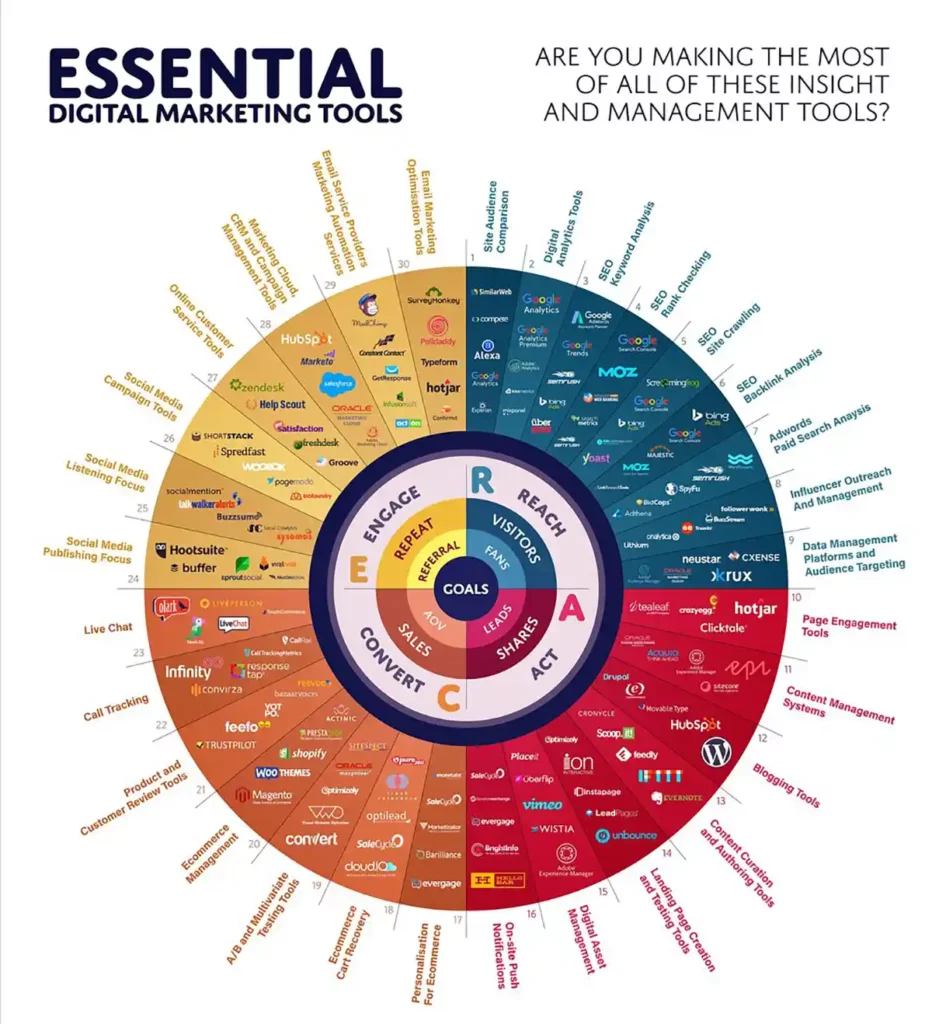
We’re excited about new AI tools like GPT4ALL and the Raspberry Pi Computing testing bed, and we’re particularly fond of LLaMA.
Maybe you say, Who cares? Any business seeks better quality, higher productivity, and improved customer satisfaction. That’s who.
Artificial intelligence (AI) is revolutionizing the way businesses increase their revenue. The new predictable revenue sales model is here. MatrixAI powers the predictable revenue model.
With the help of predictive analytics, companies can now analyze customer behavior, preferences, and patterns to forecast future sales and improve their marketing strategies.
This innovative technology utilizes machine learning algorithms to extract insights from vast datasets and pinpoint areas where a business can generate additional revenue. AI-powered chatbots are another way to boost your target revenue by providing 24/7 customer service and support.
By automating simple tasks, chatbots can free up valuable time for employees to focus on more complex tasks that require human interaction. By embracing AI, businesses can enhance their revenue streams and remain competitive in today’s fast-paced market.
A. Definition and understanding of predictable revenue
Predictable revenue refers to a consistent stream of income that can be anticipated and planned for by businesses. This means having a reliable method of generating revenue with high confidence in its predictability.
A company with reliable revenue can forecast future growth, allocate resources more effectively, and make informed decisions that lead to long-term success. Predictable revenue is crucial for businesses seeking to scale quickly and sustainably.
It allows companies to confidently invest in marketing, sales, and customer service initiatives, all while providing a reliable source of cash flow. By generating a revenue stream, businesses can position themselves for sustainable growth and enhanced profitability.
B. Role of AI in revenue predictability
As businesses navigate an ever-changing market, the role of artificial intelligence (AI) in enhancing revenue predictability has become increasingly important.
AI can help companies make informed pricing, inventory, and sales decisions by analyzing past data and identifying trends. This allows businesses to anticipate demand and potentially increase their profits.
Beyond revenue predictability, AI can also assist with customer segmentation and personalized marketing, thereby improving overall customer satisfaction and addressing concerns about AI’s ethical implications.
Still, its ability to adapt to changing market conditions makes it a valuable tool for companies seeking to stay ahead.
1. Predictive analytics for future revenue trends
In today’s fast-paced business world, companies continually seek ways to stay ahead of the curve. One way to do this is by using predictive analytics to forecast future revenue trends.
Businesses can gain valuable insights into future revenue by analyzing historical data and market conditions. This information can help companies make informed decisions about future investments and allocate resources accordingly.
Whether identifying new growth opportunities or mitigating potential risks, predictive analytics can give businesses a competitive edge in today’s ever-changing marketplace. The future of revenue forecasting is here, and it’s all about predictive analytics.
2. AI for churn prediction and customer retention
In today’s fast-paced world, customer loyalty is more important than ever. Companies need to understand what drives their customers to leave and take proactive measures to retain them.
That’s where artificial intelligence comes in. By analyzing data from customer interactions, AI can predict which customers are likely to churn and recommend strategies to keep them engaged.
This technology also facilitates the identification of trends and patterns in customer behavior, enabling companies to tailor their marketing efforts to individual needs. With AI for churn prediction and customer retention, businesses can stay ahead of the game and build long-lasting customer relationships.
C. Case Studies: Companies successfully using AI for Reliable revenue
Artificial Intelligence (AI) is transforming the way businesses operate, and companies that have leveraged AI technologies have experienced phenomenal revenue growth.
Case studies reveal how AI has helped companies predict and even shape consumer behavior. One such example is Coca-Cola, which utilized AI to create personalized e-commerce experiences for its customers, resulting in a 28% increase in revenue.
Another example is Spotify, which utilizes AI to personalize user recommendations, creating a better experience for music lovers. These case studies demonstrate how AI can drive predictable business revenue growth across various industries. As more companies adopt AI, it is clear that this technology will continue to shape the way we conduct business.
V. Future Prospects of AI in Digital Marketing and Revenue Prediction
Artificial intelligence (AI) is rapidly transforming the digital marketing landscape, and the prospects are both exciting and promising.
With AI, businesses can now process and analyze vast amounts of data, enabling them to make informed and accurate revenue predictions based on consumer behavior. This enables marketers to develop more targeted and personalized marketing strategies that provide a more personalized experience for their customers.
And this is just the start. As AI continues to develop, we can expect to see more advanced algorithms and predictive models that will enable companies to create even more effective and efficient marketing campaigns. Overall, the future of AI in digital marketing is promising, and businesses that adopt this technology will undoubtedly reap the benefits in the years to come.
A. Evolution of AI technologies and their potential impact
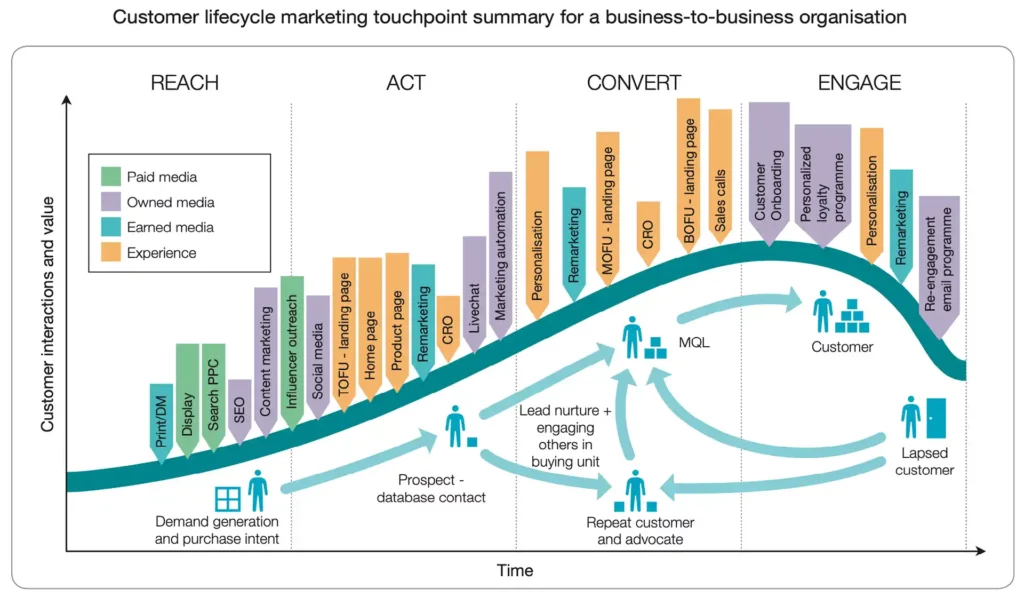
Artificial Intelligence, also known as AI, has advanced significantly since its inception. With technological advancements, we have seen AI technologies emerging from chatbots to self-driving cars.
These advancements have brought new opportunities and solutions to various fields, including healthcare and finance. The potential impact of AI technologies is enormous, as it presents an opportunity to revolutionize how we live and work.
However, it also raises concerns about job displacement and ethical dilemmas. As we continue to evolve, it is crucial to weigh the benefits and risks associated with AI technologies so that we may harness their potential while avoiding the pitfalls.
B. Emerging trends in AI that could influence digital marketing
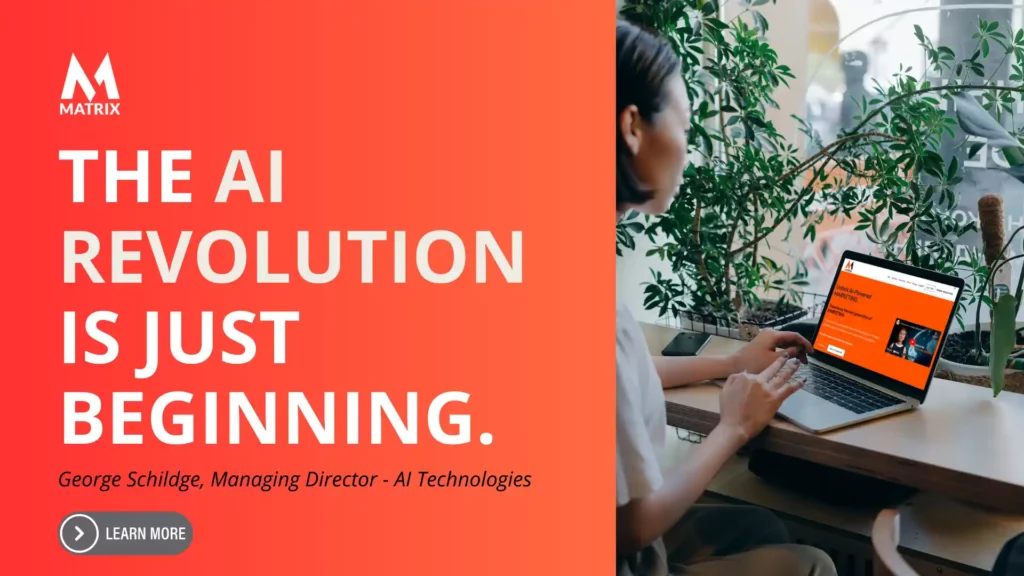
As technology continues to evolve, so do the possibilities for artificial intelligence (AI) in digital marketing. One emerging trend is AI-powered chatbots, which can interact with customers in real time to provide personalized assistance and streamline purchasing.
Another trend is the integration of machine learning algorithms, which can analyze large amounts of data to create more targeted advertising campaigns and recommendation engines.
Natural language processing (NLP) is becoming increasingly sophisticated, allowing AI to understand and respond to human language more effectively. These advancements have the potential to greatly enhance the customer experience and increase the effectiveness of digital marketing efforts.
C. Potential challenges and solutions
As with any undertaking, challenges are bound to arise when pursuing a new goal. These challenges can seriously threaten a company’s success in the business world. However, these challenges can be overcome with the right mindset and approach. Whether it’s budget restrictions, employee turnover, or external market conditions, there’s always a solution to be found.
Success requires flexibility, creativity, and a willingness to adapt when faced with obstacles. By acknowledging potential challenges and proactively seeking solutions, businesses can set themselves up for long-term success.
VI. Predictable Revenue Summary
Achieving dependable revenue is vital for any business. It requires a deep understanding of your target audience, effective communication with your team, and continuous analysis of your sales strategies.
You can improve customer relationships and increase revenue predictability by implementing and adjusting specific sales processes. Solidifying your sales pipeline by identifying areas of improvement and optimizing your strategy can set you up for long-term success.
Consistency and a willingness to adapt to change are the keys to achieving reliable revenue. With the right approach, your business can enjoy a steady revenue stream, providing a solid foundation for growth and expansion.
A. Recap of the impact of AI on digital marketing and dependable revenue
Digital marketing has undergone significant evolution over the years, with the emergence of AI being one of the most notable changes.
AI has transformed how businesses reach their target audience by providing powerful insights and data-driven strategies to predict buying patterns and drive revenue growth.
With MatrixAI, marketers can analyze massive amounts of data in seconds, personalize content based on individual preferences, and automate customer experiences to deliver a seamless and personalized experience.
The impact of AI on digital marketing has been remarkable, resulting in higher engagement rates, improved lead generation, and increased customer loyalty. As AI evolves, marketers are well-positioned to harness this technology to drive more reliable revenue streams.
B. The need for businesses to adopt AI strategies in digital marketing
As technology evolves at an unprecedented rate, businesses must keep pace or risk being left behind. Integrating artificial intelligence (AI) into digital marketing has become increasingly important in recent years.
AI can help businesses create more personalized and targeted marketing campaigns, as well as assist in data analysis and customer engagement. With the vast amount of data collected from various online platforms, AI can help businesses make sense of it all and make informed decisions based on the data.
Adopting an AI strategy in digital marketing benefits businesses and improves the overall customer experience. In today’s competitive market, businesses must stay ahead of the game, and AI is one surefire way to do so.
VII. How does Matrix Marketing Group’s MatrixAI help businesses reach the ultimate goal of predictable revenue?
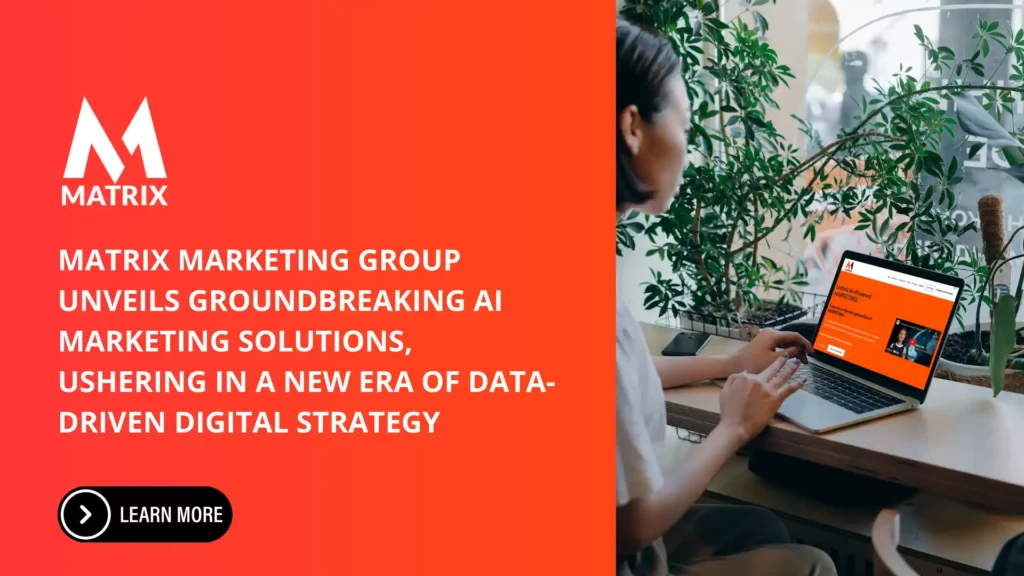
As an innovative leader in the marketing industry, Matrix Marketing Group has developed an incredibly powerful tool that helps businesses achieve the ultimate goal of dependable revenue.
With the MatrixAI platform, companies can leverage cutting-edge artificial intelligence technology to refine their marketing strategies, target the right audiences, and boost their overall customer engagement.
By utilizing the vast amounts of data generated by the platform, businesses gain a deeper understanding of their customers and insights that lead to more effective advertising campaigns.
The result is a more reliable revenue stream that boosts the bottom line and drives long-term growth. With MatrixAI, businesses can finally unlock the full potential of their marketing efforts and take their operations to the next level.
AI-driven digital marketing can help companies increase their reliable revenue. By understanding the concept and application of AI tools, such as predictive analytics, companies can better anticipate future market trends and ultimately enhance their customer retention strategies.
By examining successful case studies, businesses can also assess how to effectively utilize AI services to drive consistent growth and achieve greater success.
Matrix Marketing Group’s MatrixAI offers a comprehensive suite of innovative digital marketing solutions, enabling businesses to maximize their return on investment in marketing activities while ensuring scalability for future operations.
Leverage the power of MatrixAI and unlock consistent growth with predictable revenue for your business today!
General FAQs
What is AI digital marketing?

AI digital marketing leverages artificial intelligence (AI) technologies, including machine learning, natural language processing, and predictive analytics, to enhance and refine marketing strategies. This can include personalizing customer experiences, analyzing consumer behavior, optimizing advertising campaigns, and automating routine tasks.
How does AI digital marketing contribute to predictable revenue?

AI digital marketing helps increase reliable revenue in several ways. Firstly, it enables a business to target potential customers more accurately, thereby improving the efficiency and effectiveness of marketing campaigns. Secondly, through predictive analytics, AI can anticipate customer behavior, identify potential churn, and suggest strategies for customer retention. AI can provide insights into market trends and customer preferences, allowing businesses to better align their products or services with market demand.
What are some examples of AI technologies used in digital marketing?

AI technologies widely used in digital marketing include machine learning for predicting customer behavior, chatbots for enhanced customer service, natural language processing for sentiment analysis in social media marketing, and algorithms for personalized advertising. Additionally, AI can automate email marketing, content creation, and other marketing tasks, enabling businesses to focus more on strategy and less on routine activities.
Are there any potential challenges in implementing AI in digital marketing?

Despite its numerous benefits, implementing AI in digital marketing has some challenges. These can include the need for high-quality data for training AI systems, potential bias in AI algorithms, and customer privacy and data security issues. Integrating AI into existing systems can also require significant resources and technical expertise. However, careful planning, ongoing monitoring, and adherence to industry best practices and regulatory requirements can often address these challenges.

